Analyzing TIABC Policy Instruments for Tax Exemptions in Tourism
VerifiedAdded on 2022/09/26
|9
|1480
|23
Report
AI Summary
This report provides an in-depth analysis of the policy instruments employed by the Tourism Industry Association of British Columbia (TIABC) to address and potentially eliminate PST (Provincial Sales Tax) and MRDT (Municipal and Regional District Tax) exemptions within the tourism sector. It examines the context of accommodation challenges in the Canadian tourism industry, highlighting the need for policies to ensure affordable housing for tourism workers, particularly in the face of short-term rental issues. The report details the policy instruments recommended by TIABC, including those designed to penalize development and incentivize long-term rentals. It also discusses the creation of policies at the municipal versus provincial levels and provides recommendations for affordable accommodation, such as inclusionary zoning and strategies for preserving existing housing stock. The conclusion emphasizes the ongoing challenges related to affordable accommodation and the importance of policies like tax imposition and zoning to address these issues effectively. The report references relevant documents and sources to support its findings, providing a comprehensive overview of the topic.
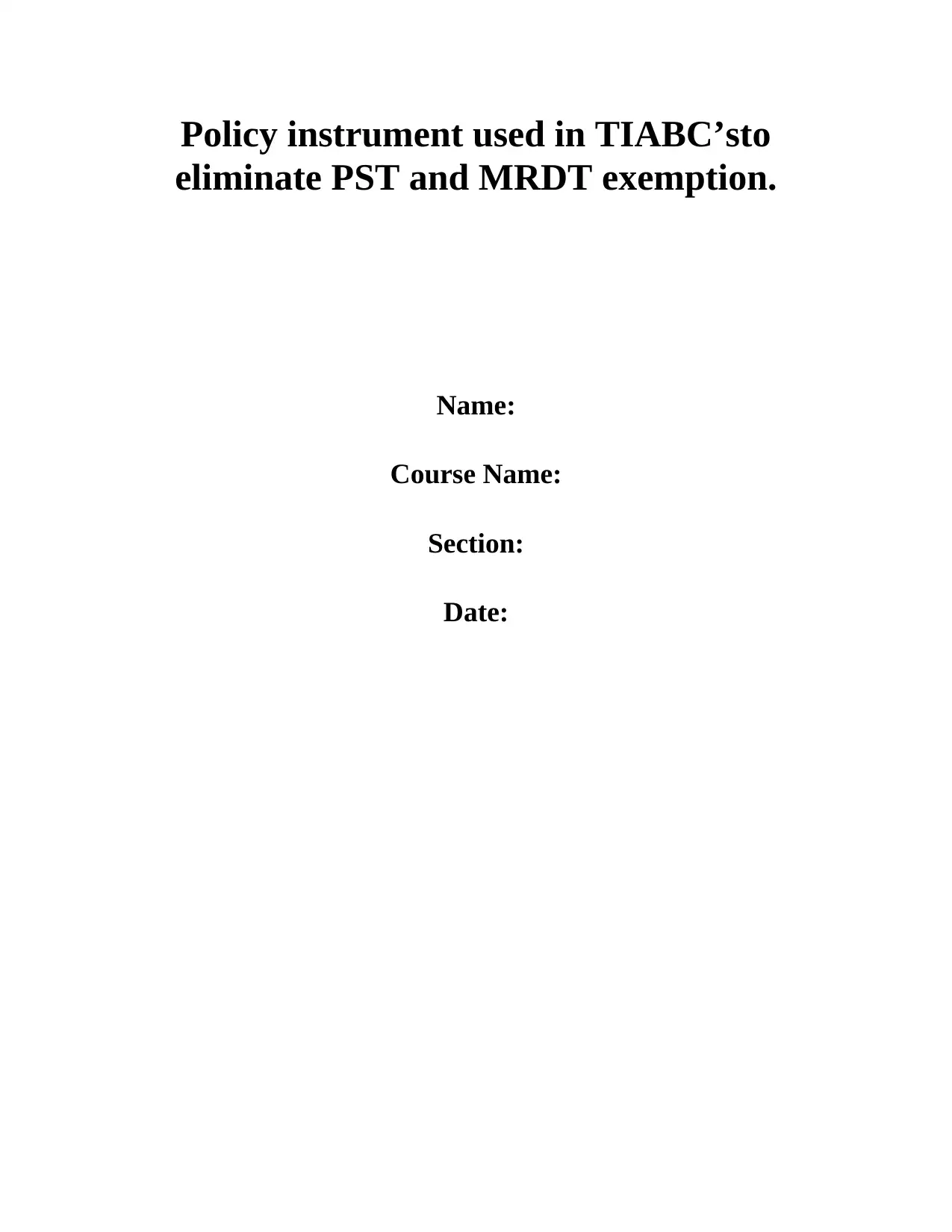
Policy instrument used in TIABC’sto
eliminate PST and MRDT exemption.
Name:
Course Name:
Section:
Date:
eliminate PST and MRDT exemption.
Name:
Course Name:
Section:
Date:
Paraphrase This Document
Need a fresh take? Get an instant paraphrase of this document with our AI Paraphraser
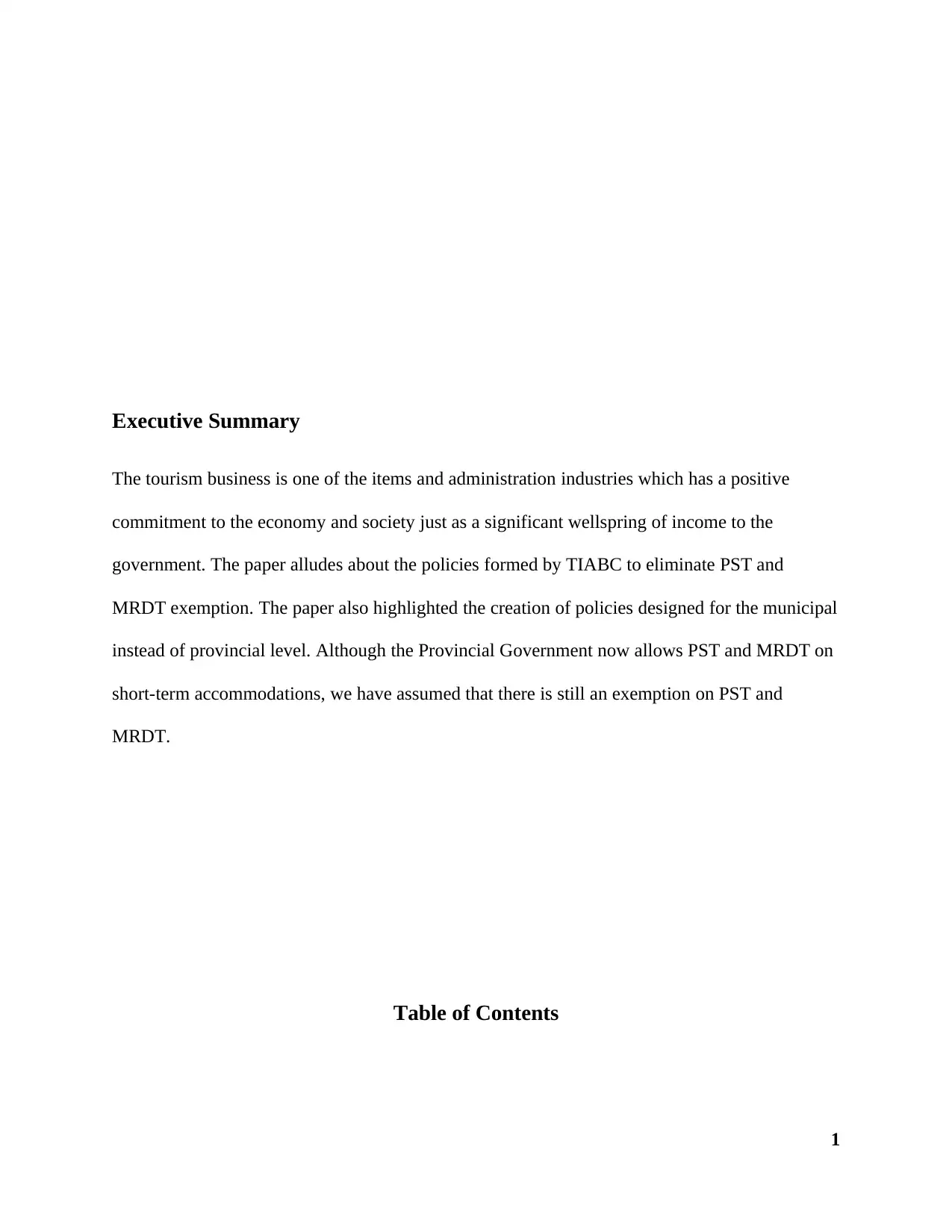
Executive Summary
The tourism business is one of the items and administration industries which has a positive
commitment to the economy and society just as a significant wellspring of income to the
government. The paper alludes about the policies formed by TIABC to eliminate PST and
MRDT exemption. The paper also highlighted the creation of policies designed for the municipal
instead of provincial level. Although the Provincial Government now allows PST and MRDT on
short-term accommodations, we have assumed that there is still an exemption on PST and
MRDT.
Table of Contents
1
The tourism business is one of the items and administration industries which has a positive
commitment to the economy and society just as a significant wellspring of income to the
government. The paper alludes about the policies formed by TIABC to eliminate PST and
MRDT exemption. The paper also highlighted the creation of policies designed for the municipal
instead of provincial level. Although the Provincial Government now allows PST and MRDT on
short-term accommodations, we have assumed that there is still an exemption on PST and
MRDT.
Table of Contents
1
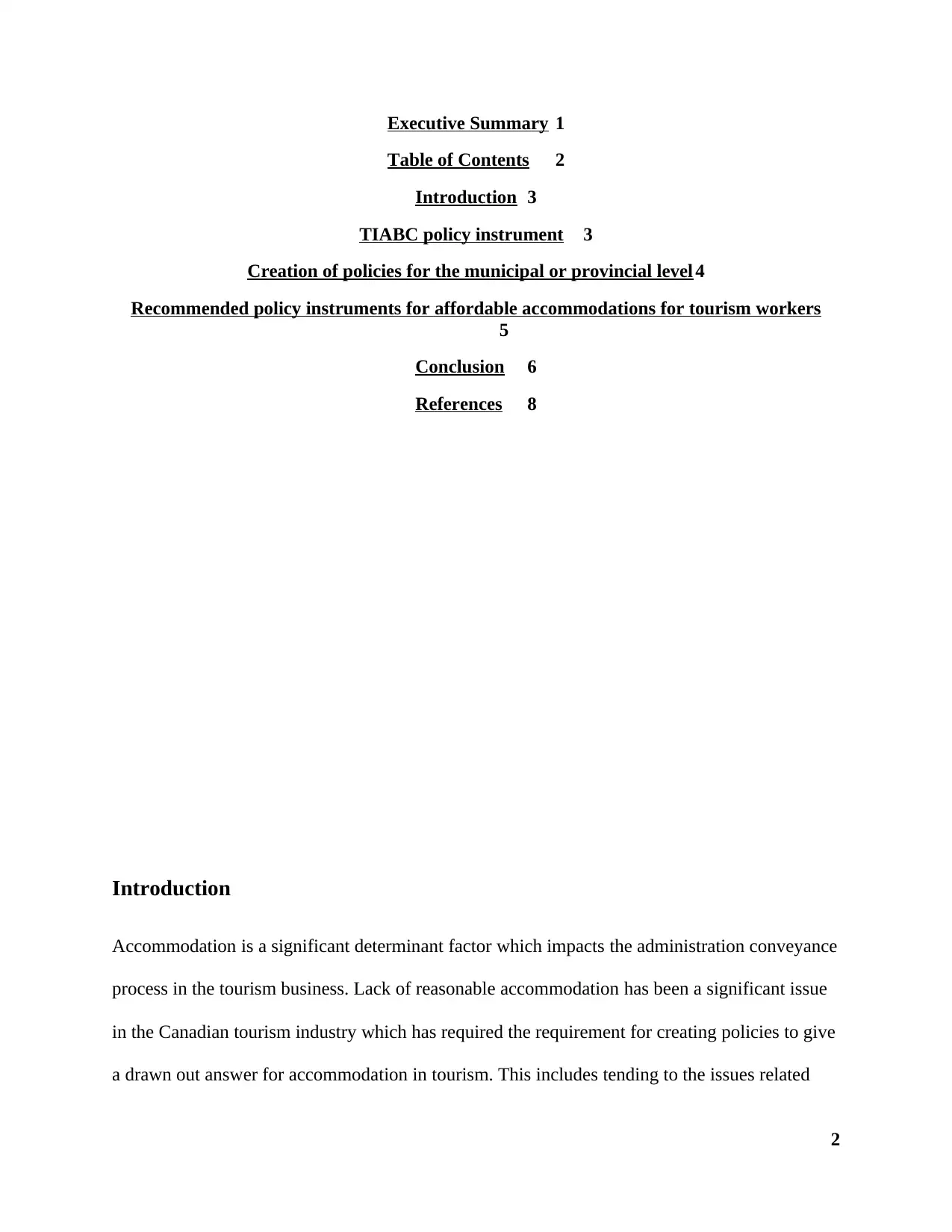
Executive Summary 1
Table of Contents 2
Introduction 3
TIABC policy instrument 3
Creation of policies for the municipal or provincial level 4
Recommended policy instruments for affordable accommodations for tourism workers
5
Conclusion 6
References 8
Introduction
Accommodation is a significant determinant factor which impacts the administration conveyance
process in the tourism business. Lack of reasonable accommodation has been a significant issue
in the Canadian tourism industry which has required the requirement for creating policies to give
a drawn out answer for accommodation in tourism. This includes tending to the issues related
2
Table of Contents 2
Introduction 3
TIABC policy instrument 3
Creation of policies for the municipal or provincial level 4
Recommended policy instruments for affordable accommodations for tourism workers
5
Conclusion 6
References 8
Introduction
Accommodation is a significant determinant factor which impacts the administration conveyance
process in the tourism business. Lack of reasonable accommodation has been a significant issue
in the Canadian tourism industry which has required the requirement for creating policies to give
a drawn out answer for accommodation in tourism. This includes tending to the issues related
2
⊘ This is a preview!⊘
Do you want full access?
Subscribe today to unlock all pages.

Trusted by 1+ million students worldwide
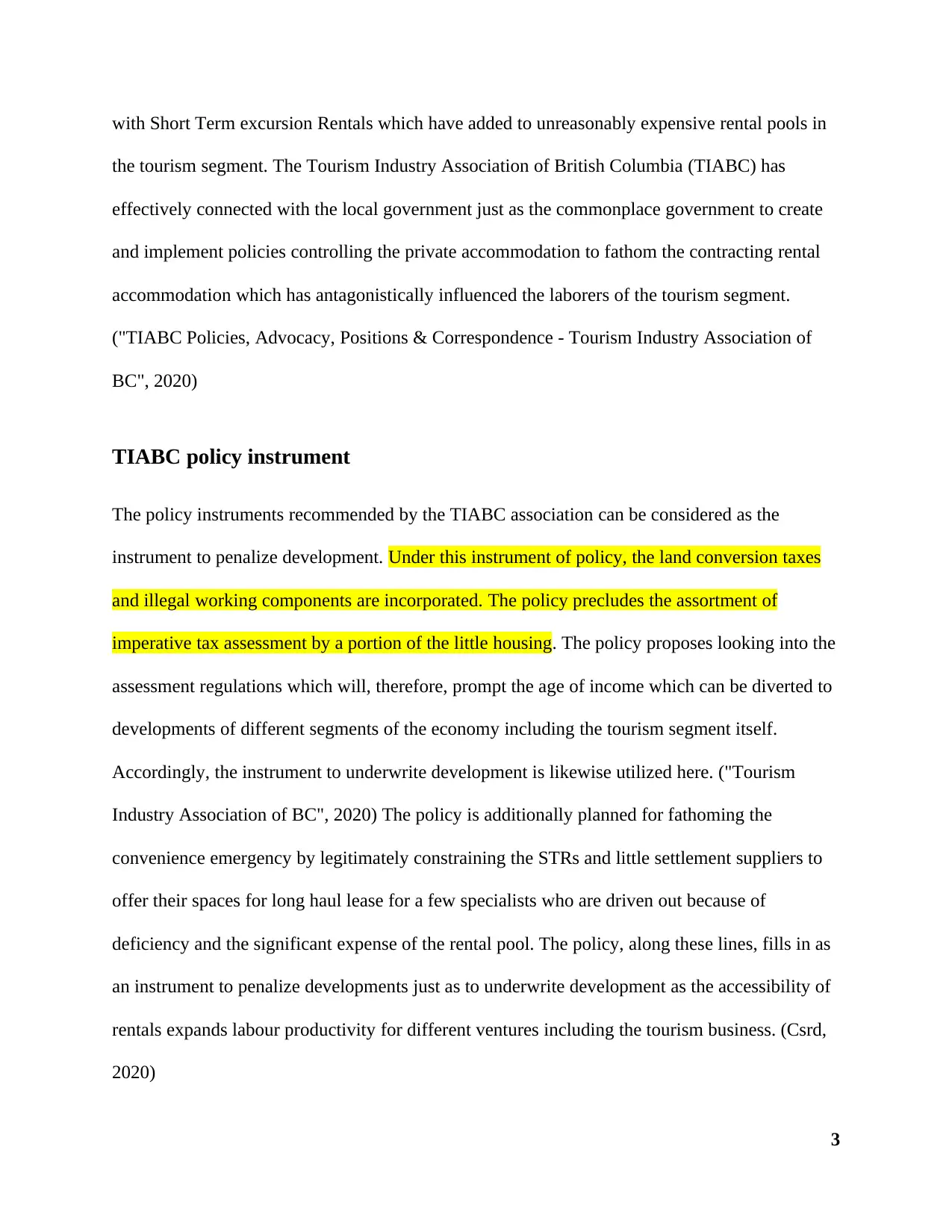
with Short Term excursion Rentals which have added to unreasonably expensive rental pools in
the tourism segment. The Tourism Industry Association of British Columbia (TIABC) has
effectively connected with the local government just as the commonplace government to create
and implement policies controlling the private accommodation to fathom the contracting rental
accommodation which has antagonistically influenced the laborers of the tourism segment.
("TIABC Policies, Advocacy, Positions & Correspondence - Tourism Industry Association of
BC", 2020)
TIABC policy instrument
The policy instruments recommended by the TIABC association can be considered as the
instrument to penalize development. Under this instrument of policy, the land conversion taxes
and illegal working components are incorporated. The policy precludes the assortment of
imperative tax assessment by a portion of the little housing. The policy proposes looking into the
assessment regulations which will, therefore, prompt the age of income which can be diverted to
developments of different segments of the economy including the tourism segment itself.
Accordingly, the instrument to underwrite development is likewise utilized here. ("Tourism
Industry Association of BC", 2020) The policy is additionally planned for fathoming the
convenience emergency by legitimately constraining the STRs and little settlement suppliers to
offer their spaces for long haul lease for a few specialists who are driven out because of
deficiency and the significant expense of the rental pool. The policy, along these lines, fills in as
an instrument to penalize developments just as to underwrite development as the accessibility of
rentals expands labour productivity for different ventures including the tourism business. (Csrd,
2020)
3
the tourism segment. The Tourism Industry Association of British Columbia (TIABC) has
effectively connected with the local government just as the commonplace government to create
and implement policies controlling the private accommodation to fathom the contracting rental
accommodation which has antagonistically influenced the laborers of the tourism segment.
("TIABC Policies, Advocacy, Positions & Correspondence - Tourism Industry Association of
BC", 2020)
TIABC policy instrument
The policy instruments recommended by the TIABC association can be considered as the
instrument to penalize development. Under this instrument of policy, the land conversion taxes
and illegal working components are incorporated. The policy precludes the assortment of
imperative tax assessment by a portion of the little housing. The policy proposes looking into the
assessment regulations which will, therefore, prompt the age of income which can be diverted to
developments of different segments of the economy including the tourism segment itself.
Accordingly, the instrument to underwrite development is likewise utilized here. ("Tourism
Industry Association of BC", 2020) The policy is additionally planned for fathoming the
convenience emergency by legitimately constraining the STRs and little settlement suppliers to
offer their spaces for long haul lease for a few specialists who are driven out because of
deficiency and the significant expense of the rental pool. The policy, along these lines, fills in as
an instrument to penalize developments just as to underwrite development as the accessibility of
rentals expands labour productivity for different ventures including the tourism business. (Csrd,
2020)
3
Paraphrase This Document
Need a fresh take? Get an instant paraphrase of this document with our AI Paraphraser
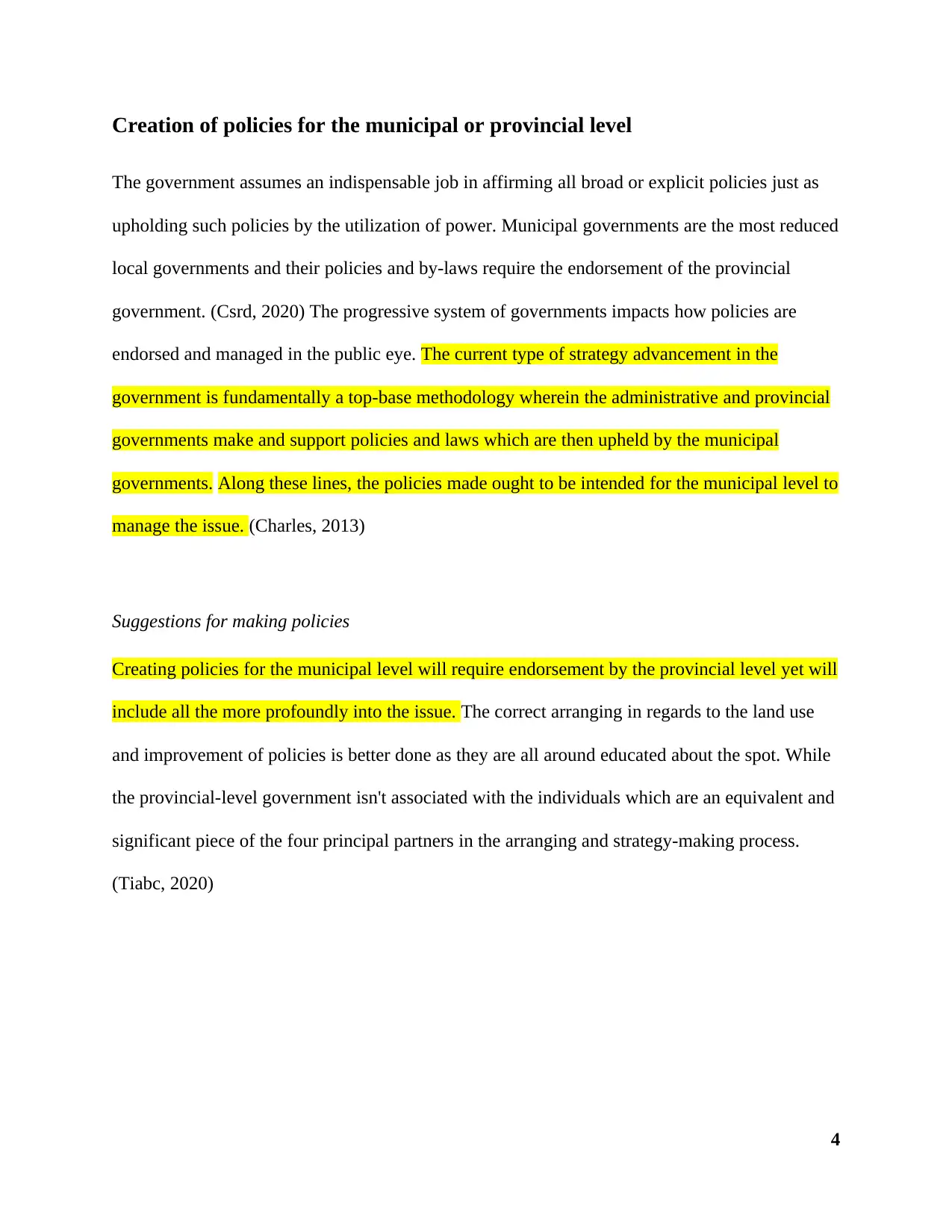
Creation of policies for the municipal or provincial level
The government assumes an indispensable job in affirming all broad or explicit policies just as
upholding such policies by the utilization of power. Municipal governments are the most reduced
local governments and their policies and by-laws require the endorsement of the provincial
government. (Csrd, 2020) The progressive system of governments impacts how policies are
endorsed and managed in the public eye. The current type of strategy advancement in the
government is fundamentally a top-base methodology wherein the administrative and provincial
governments make and support policies and laws which are then upheld by the municipal
governments. Along these lines, the policies made ought to be intended for the municipal level to
manage the issue. (Charles, 2013)
Suggestions for making policies
Creating policies for the municipal level will require endorsement by the provincial level yet will
include all the more profoundly into the issue. The correct arranging in regards to the land use
and improvement of policies is better done as they are all around educated about the spot. While
the provincial-level government isn't associated with the individuals which are an equivalent and
significant piece of the four principal partners in the arranging and strategy-making process.
(Tiabc, 2020)
4
The government assumes an indispensable job in affirming all broad or explicit policies just as
upholding such policies by the utilization of power. Municipal governments are the most reduced
local governments and their policies and by-laws require the endorsement of the provincial
government. (Csrd, 2020) The progressive system of governments impacts how policies are
endorsed and managed in the public eye. The current type of strategy advancement in the
government is fundamentally a top-base methodology wherein the administrative and provincial
governments make and support policies and laws which are then upheld by the municipal
governments. Along these lines, the policies made ought to be intended for the municipal level to
manage the issue. (Charles, 2013)
Suggestions for making policies
Creating policies for the municipal level will require endorsement by the provincial level yet will
include all the more profoundly into the issue. The correct arranging in regards to the land use
and improvement of policies is better done as they are all around educated about the spot. While
the provincial-level government isn't associated with the individuals which are an equivalent and
significant piece of the four principal partners in the arranging and strategy-making process.
(Tiabc, 2020)
4
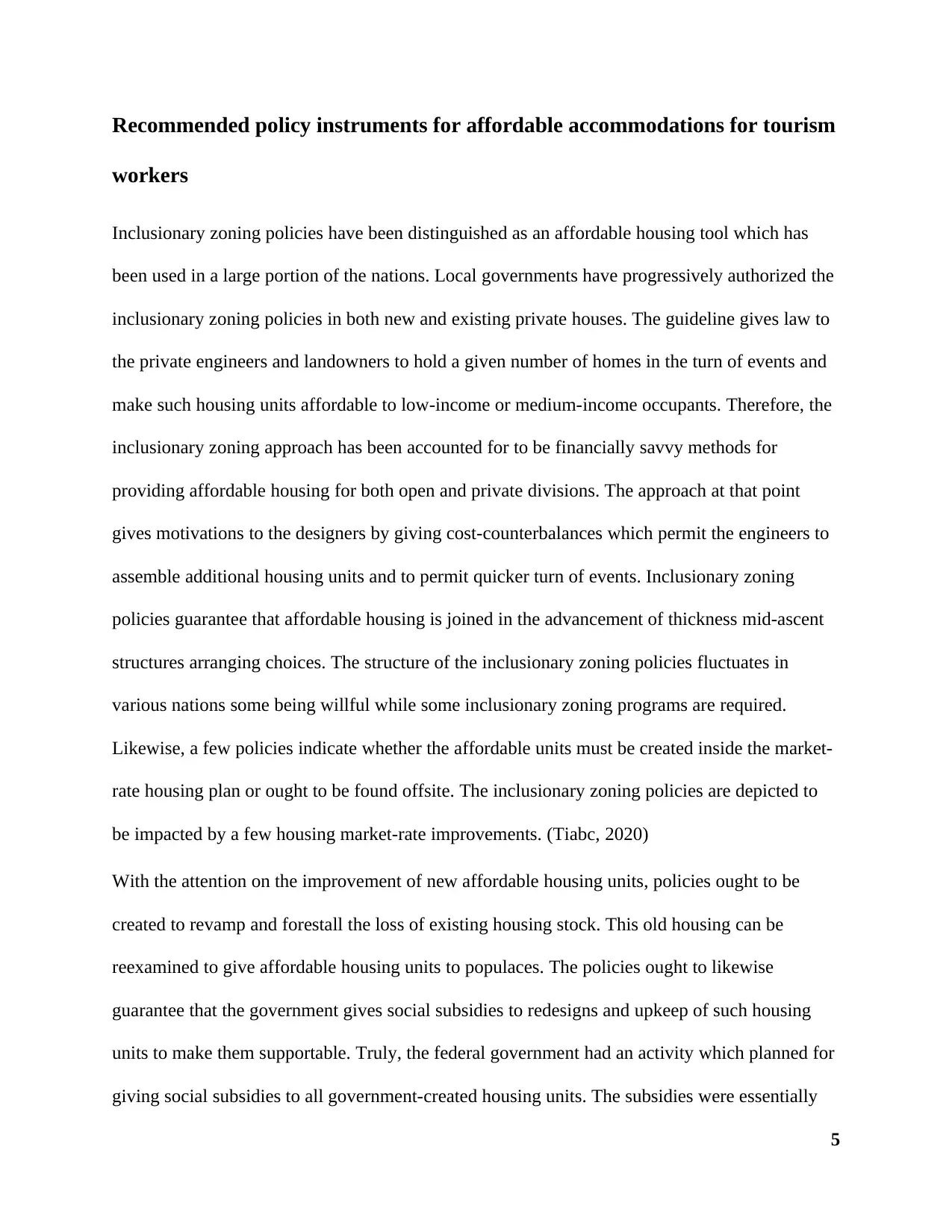
Recommended policy instruments for affordable accommodations for tourism
workers
Inclusionary zoning policies have been distinguished as an affordable housing tool which has
been used in a large portion of the nations. Local governments have progressively authorized the
inclusionary zoning policies in both new and existing private houses. The guideline gives law to
the private engineers and landowners to hold a given number of homes in the turn of events and
make such housing units affordable to low-income or medium-income occupants. Therefore, the
inclusionary zoning approach has been accounted for to be financially savvy methods for
providing affordable housing for both open and private divisions. The approach at that point
gives motivations to the designers by giving cost-counterbalances which permit the engineers to
assemble additional housing units and to permit quicker turn of events. Inclusionary zoning
policies guarantee that affordable housing is joined in the advancement of thickness mid-ascent
structures arranging choices. The structure of the inclusionary zoning policies fluctuates in
various nations some being willful while some inclusionary zoning programs are required.
Likewise, a few policies indicate whether the affordable units must be created inside the market-
rate housing plan or ought to be found offsite. The inclusionary zoning policies are depicted to
be impacted by a few housing market-rate improvements. (Tiabc, 2020)
With the attention on the improvement of new affordable housing units, policies ought to be
created to revamp and forestall the loss of existing housing stock. This old housing can be
reexamined to give affordable housing units to populaces. The policies ought to likewise
guarantee that the government gives social subsidies to redesigns and upkeep of such housing
units to make them supportable. Truly, the federal government had an activity which planned for
giving social subsidies to all government-created housing units. The subsidies were essentially
5
workers
Inclusionary zoning policies have been distinguished as an affordable housing tool which has
been used in a large portion of the nations. Local governments have progressively authorized the
inclusionary zoning policies in both new and existing private houses. The guideline gives law to
the private engineers and landowners to hold a given number of homes in the turn of events and
make such housing units affordable to low-income or medium-income occupants. Therefore, the
inclusionary zoning approach has been accounted for to be financially savvy methods for
providing affordable housing for both open and private divisions. The approach at that point
gives motivations to the designers by giving cost-counterbalances which permit the engineers to
assemble additional housing units and to permit quicker turn of events. Inclusionary zoning
policies guarantee that affordable housing is joined in the advancement of thickness mid-ascent
structures arranging choices. The structure of the inclusionary zoning policies fluctuates in
various nations some being willful while some inclusionary zoning programs are required.
Likewise, a few policies indicate whether the affordable units must be created inside the market-
rate housing plan or ought to be found offsite. The inclusionary zoning policies are depicted to
be impacted by a few housing market-rate improvements. (Tiabc, 2020)
With the attention on the improvement of new affordable housing units, policies ought to be
created to revamp and forestall the loss of existing housing stock. This old housing can be
reexamined to give affordable housing units to populaces. The policies ought to likewise
guarantee that the government gives social subsidies to redesigns and upkeep of such housing
units to make them supportable. Truly, the federal government had an activity which planned for
giving social subsidies to all government-created housing units. The subsidies were essentially
5
⊘ This is a preview!⊘
Do you want full access?
Subscribe today to unlock all pages.

Trusted by 1+ million students worldwide
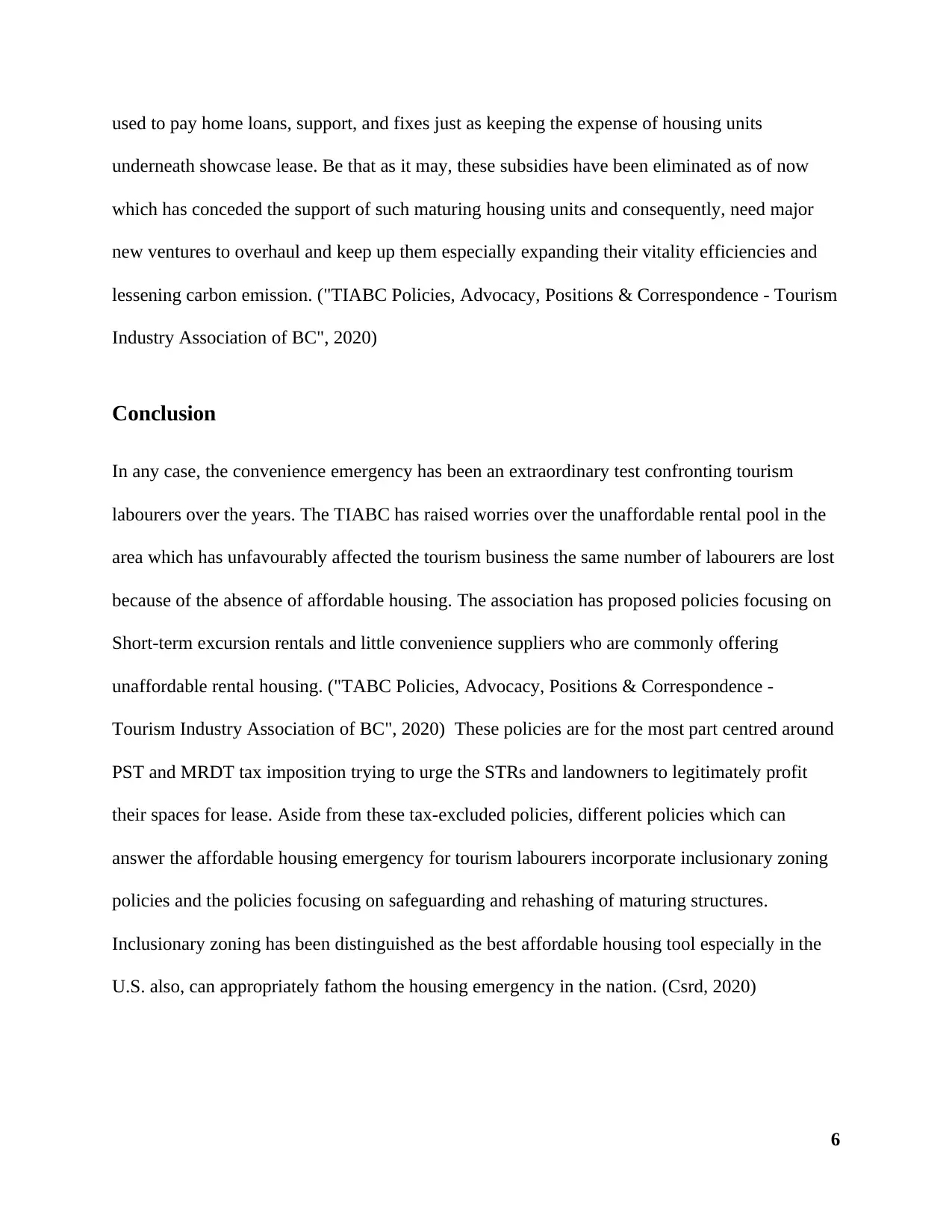
used to pay home loans, support, and fixes just as keeping the expense of housing units
underneath showcase lease. Be that as it may, these subsidies have been eliminated as of now
which has conceded the support of such maturing housing units and consequently, need major
new ventures to overhaul and keep up them especially expanding their vitality efficiencies and
lessening carbon emission. ("TIABC Policies, Advocacy, Positions & Correspondence - Tourism
Industry Association of BC", 2020)
Conclusion
In any case, the convenience emergency has been an extraordinary test confronting tourism
labourers over the years. The TIABC has raised worries over the unaffordable rental pool in the
area which has unfavourably affected the tourism business the same number of labourers are lost
because of the absence of affordable housing. The association has proposed policies focusing on
Short-term excursion rentals and little convenience suppliers who are commonly offering
unaffordable rental housing. ("TABC Policies, Advocacy, Positions & Correspondence -
Tourism Industry Association of BC", 2020) These policies are for the most part centred around
PST and MRDT tax imposition trying to urge the STRs and landowners to legitimately profit
their spaces for lease. Aside from these tax-excluded policies, different policies which can
answer the affordable housing emergency for tourism labourers incorporate inclusionary zoning
policies and the policies focusing on safeguarding and rehashing of maturing structures.
Inclusionary zoning has been distinguished as the best affordable housing tool especially in the
U.S. also, can appropriately fathom the housing emergency in the nation. (Csrd, 2020)
6
underneath showcase lease. Be that as it may, these subsidies have been eliminated as of now
which has conceded the support of such maturing housing units and consequently, need major
new ventures to overhaul and keep up them especially expanding their vitality efficiencies and
lessening carbon emission. ("TIABC Policies, Advocacy, Positions & Correspondence - Tourism
Industry Association of BC", 2020)
Conclusion
In any case, the convenience emergency has been an extraordinary test confronting tourism
labourers over the years. The TIABC has raised worries over the unaffordable rental pool in the
area which has unfavourably affected the tourism business the same number of labourers are lost
because of the absence of affordable housing. The association has proposed policies focusing on
Short-term excursion rentals and little convenience suppliers who are commonly offering
unaffordable rental housing. ("TABC Policies, Advocacy, Positions & Correspondence -
Tourism Industry Association of BC", 2020) These policies are for the most part centred around
PST and MRDT tax imposition trying to urge the STRs and landowners to legitimately profit
their spaces for lease. Aside from these tax-excluded policies, different policies which can
answer the affordable housing emergency for tourism labourers incorporate inclusionary zoning
policies and the policies focusing on safeguarding and rehashing of maturing structures.
Inclusionary zoning has been distinguished as the best affordable housing tool especially in the
U.S. also, can appropriately fathom the housing emergency in the nation. (Csrd, 2020)
6
Paraphrase This Document
Need a fresh take? Get an instant paraphrase of this document with our AI Paraphraser
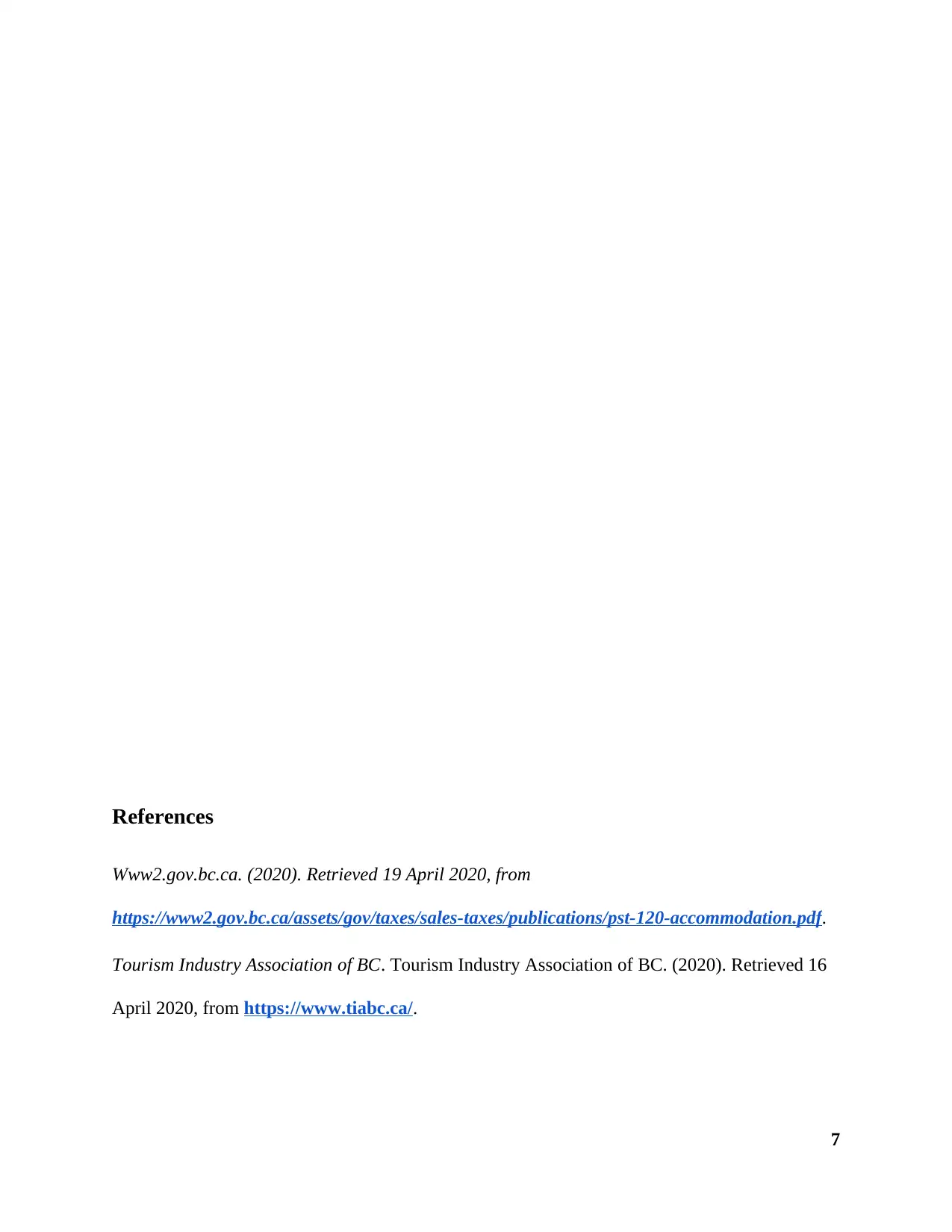
References
Www2.gov.bc.ca. (2020). Retrieved 19 April 2020, from
https://www2.gov.bc.ca/assets/gov/taxes/sales-taxes/publications/pst-120-accommodation.pdf.
Tourism Industry Association of BC. Tourism Industry Association of BC. (2020). Retrieved 16
April 2020, from https://www.tiabc.ca/.
7
Www2.gov.bc.ca. (2020). Retrieved 19 April 2020, from
https://www2.gov.bc.ca/assets/gov/taxes/sales-taxes/publications/pst-120-accommodation.pdf.
Tourism Industry Association of BC. Tourism Industry Association of BC. (2020). Retrieved 16
April 2020, from https://www.tiabc.ca/.
7
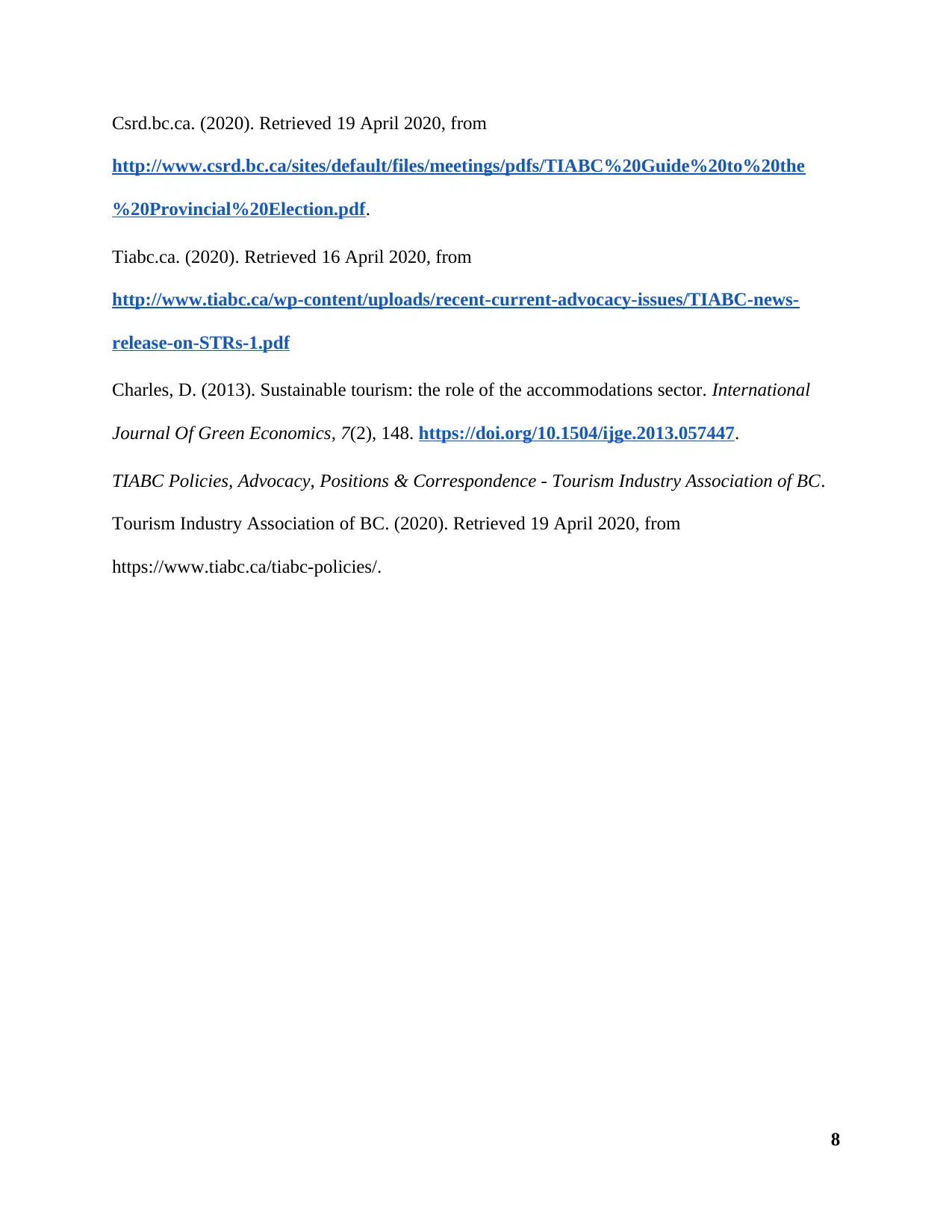
Csrd.bc.ca. (2020). Retrieved 19 April 2020, from
http://www.csrd.bc.ca/sites/default/files/meetings/pdfs/TIABC%20Guide%20to%20the
%20Provincial%20Election.pdf.
Tiabc.ca. (2020). Retrieved 16 April 2020, from
http://www.tiabc.ca/wp-content/uploads/recent-current-advocacy-issues/TIABC-news-
release-on-STRs-1.pdf
Charles, D. (2013). Sustainable tourism: the role of the accommodations sector. International
Journal Of Green Economics, 7(2), 148. https://doi.org/10.1504/ijge.2013.057447.
TIABC Policies, Advocacy, Positions & Correspondence - Tourism Industry Association of BC.
Tourism Industry Association of BC. (2020). Retrieved 19 April 2020, from
https://www.tiabc.ca/tiabc-policies/.
8
http://www.csrd.bc.ca/sites/default/files/meetings/pdfs/TIABC%20Guide%20to%20the
%20Provincial%20Election.pdf.
Tiabc.ca. (2020). Retrieved 16 April 2020, from
http://www.tiabc.ca/wp-content/uploads/recent-current-advocacy-issues/TIABC-news-
release-on-STRs-1.pdf
Charles, D. (2013). Sustainable tourism: the role of the accommodations sector. International
Journal Of Green Economics, 7(2), 148. https://doi.org/10.1504/ijge.2013.057447.
TIABC Policies, Advocacy, Positions & Correspondence - Tourism Industry Association of BC.
Tourism Industry Association of BC. (2020). Retrieved 19 April 2020, from
https://www.tiabc.ca/tiabc-policies/.
8
⊘ This is a preview!⊘
Do you want full access?
Subscribe today to unlock all pages.

Trusted by 1+ million students worldwide
1 out of 9
Related Documents
Your All-in-One AI-Powered Toolkit for Academic Success.
+13062052269
info@desklib.com
Available 24*7 on WhatsApp / Email
![[object Object]](/_next/static/media/star-bottom.7253800d.svg)
Unlock your academic potential
Copyright © 2020–2026 A2Z Services. All Rights Reserved. Developed and managed by ZUCOL.





